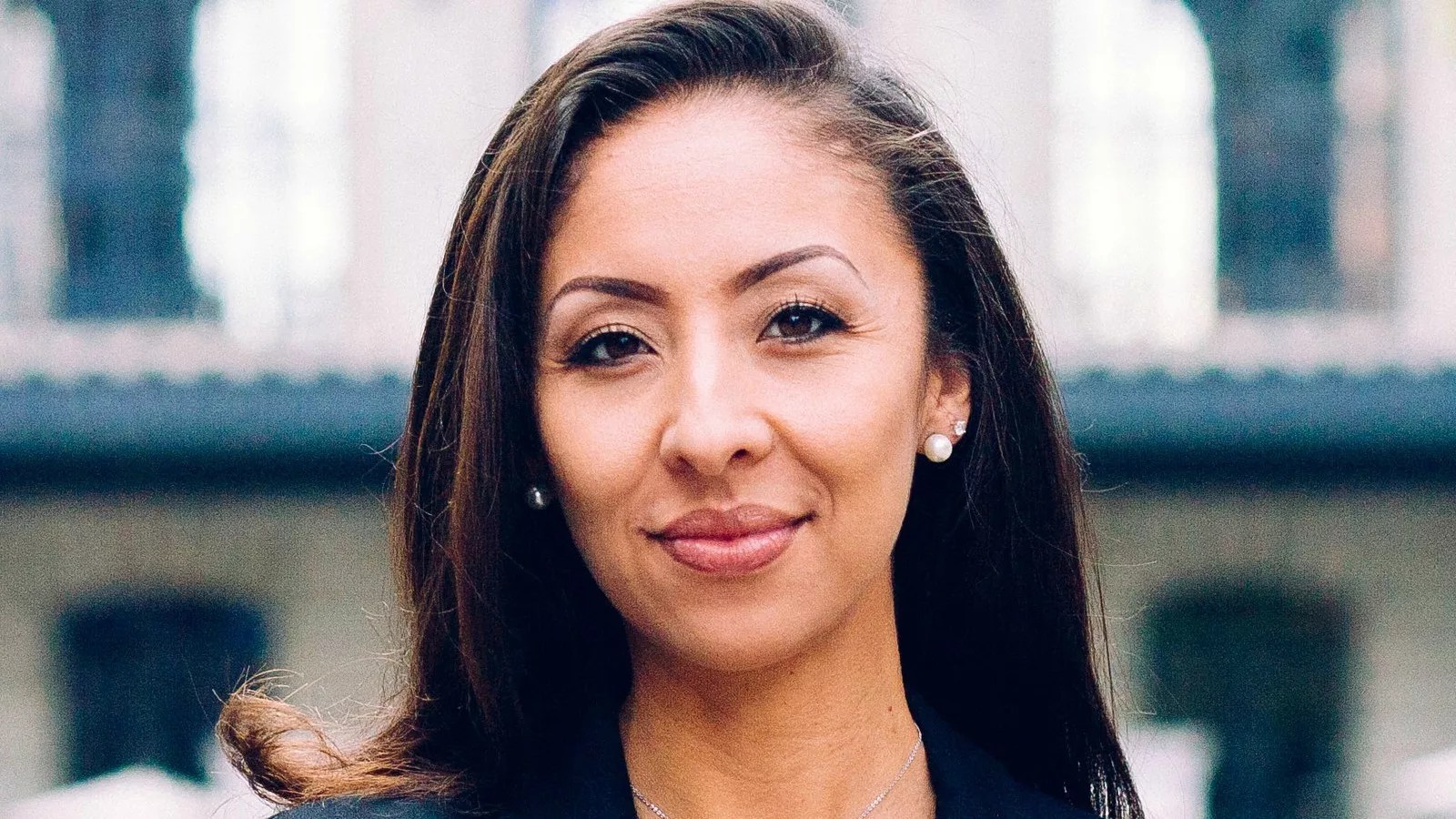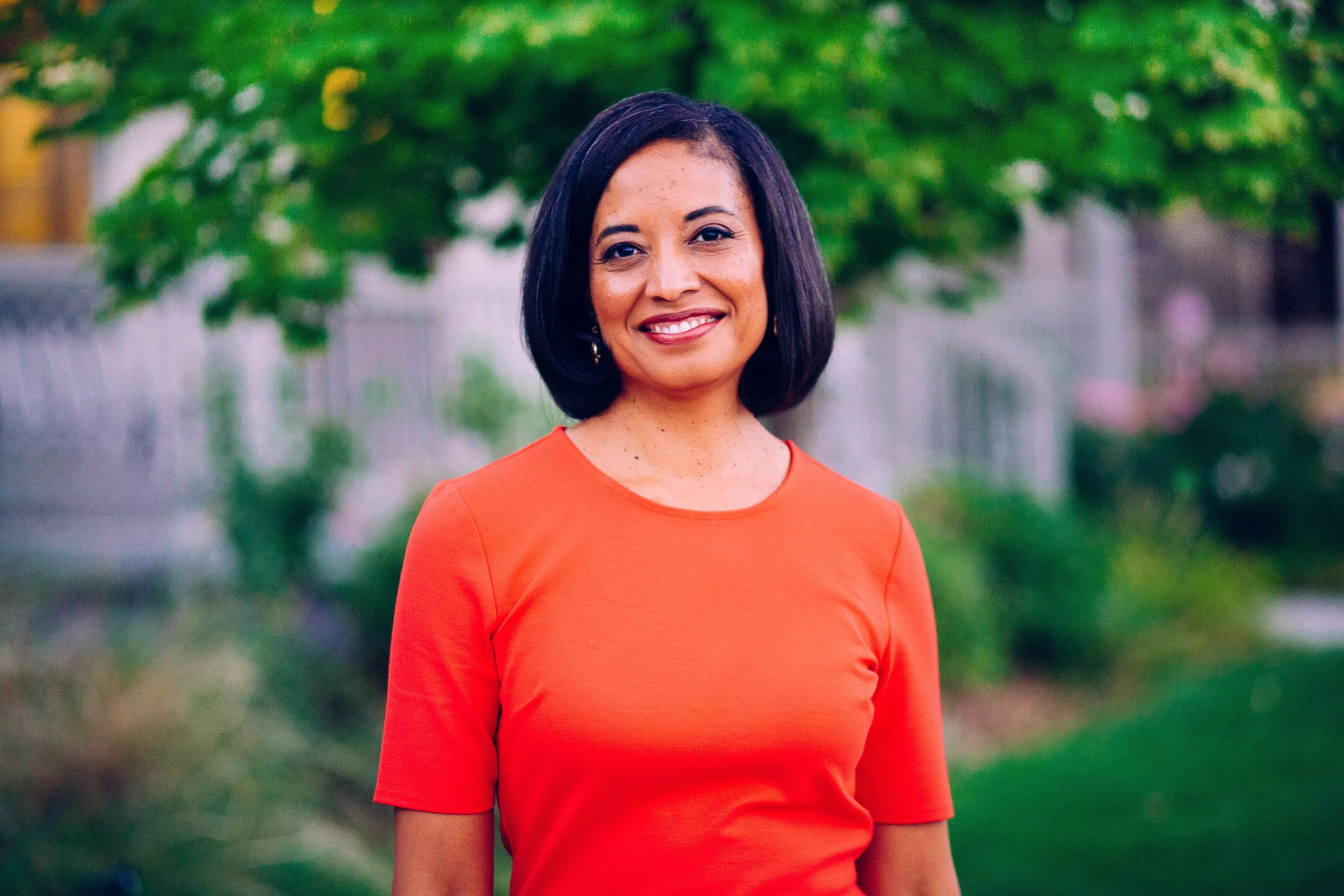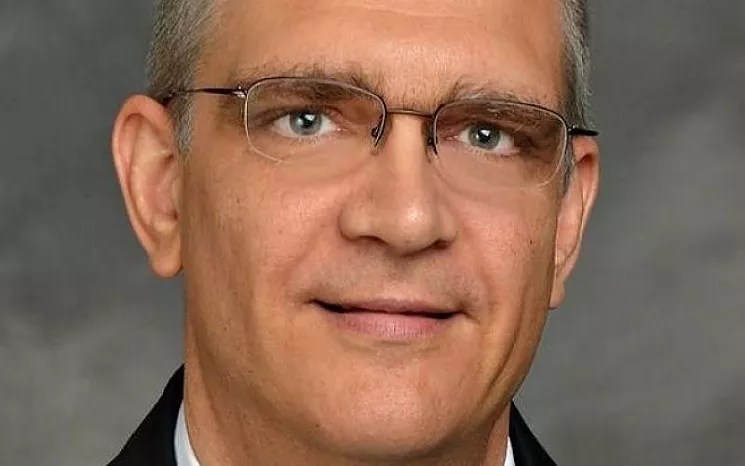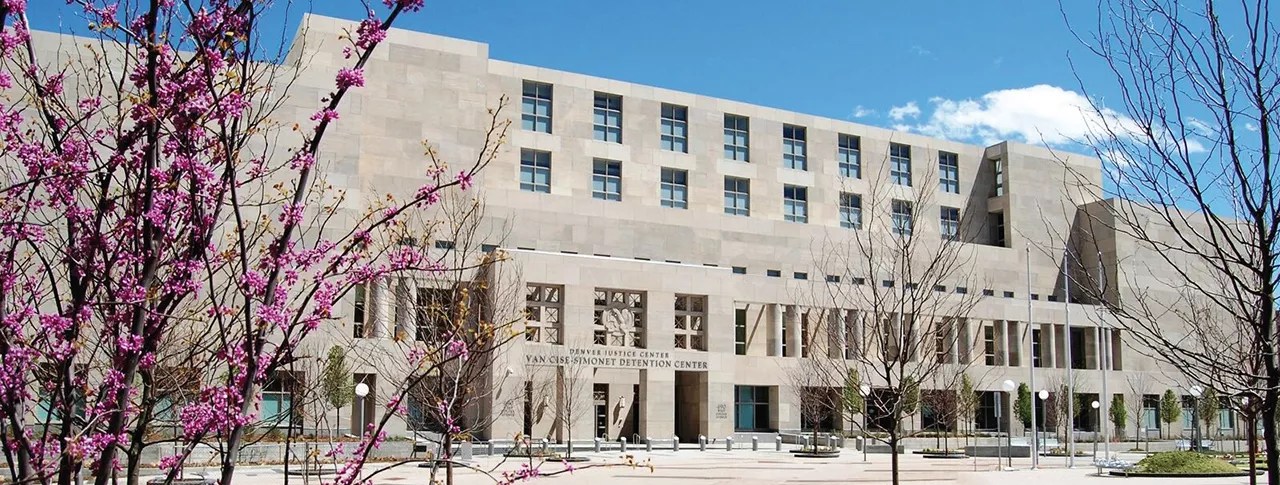
Jay Vollmar

Audio By Carbonatix
By sheer coincidence, a Denver City Council committee meeting about changing the way the city selects its sheriff happened on the same day that Patrick Firman resigned from that position. Mike Jackson, head of the sheriff deputies’ union, used the news as an opportunity to lay out what his organization wants for the future of the Denver Sheriff Department and explain to city council members how badly the DSD has fallen off-track.
“We just need good leadership and a good direction,” Jackson, a deputy himself, told councilmembers during the meeting in mid-October. “When they talk about a mission statement, we don’t know what our mission is anymore, and we need to get that under control.”
Jackson, who was joined by two members of the union, was testifying in support of a proposed ballot initiative that would turn Denver’s sheriff, currently a mayoral appointment, into an elected position.
Councilwoman Candi CdeBaca is spearheading the initiative as part of several proposals that she and other new councilmembers are backing to weaken Denver’s historically strong mayor’s office. But proponents of the initiative say it’s also designed to bring the City and County of Denver in line with the vast majority of Colorado municipalities, as well as chart a new path for what many consider a broken department.
“This is not a new idea,” CdeBaca said at the hearing. “This is a proposal that has been floated by citizens. This has been talked about for quite a while.”

Councilwoman Candi CdeBaca is heading up the elected-sheriff initiative.
Courtesy of Candi CdeBaca
Along with protecting courthouses, transporting detainees, serving warrants and legal notices, and performing a variety of other minor tasks, the Denver Sheriff Department runs the city’s two jails: the Denver Detention Center, which can hold approximately 1,500 detainees, and the Denver County Jail, which can hold a little over 900.
The two facilities have been plagued by problems in recent years. The 2010 jail death of inmate Marvin Booker led to a federal lawsuit and a city payout of $6 million to his family in 2014. That same year, the city spent $3.25 million to settle a lawsuit with Jamal Hunter, a former detainee who alleged, among other things, that deputies failed to protect him when fellow inmates scalded his genitals with boiling water.
Following these horrifying episodes and costly payouts, Mayor Michael Hancock set out to reform the sheriff’s department. The city contracted with Hillard Heintze, a national firm that specializes in investigating the effectiveness of law enforcement agencies, to assess the department and devise a plan for its future.
The Colorado Latino Forum, then co-chaired by Lisa Calderón (CdeBaca’s current top aide and a frequent critic of Hancock), began its own work identifying reforms for the department. The forum solicited feedback from citizens and, at the end of 2014, offered formal recommendations to the Hancock administration, which Calderón believes went largely ignored.
Hillard Heintze’s final report, issued in 2015, called on Denver to completely overhaul its sheriff’s department. The “first and principal finding is that the City and County of Denver needs to bring immediate, extensive and sustained reforms to almost every area of the Denver Sheriff Department’s operations in order to align DSD with national best practices in corrections, prevent incidents that result in court-ordered fines and penalties, and begin to regain public trust,” the company wrote in a letter introducing the report to Hancock.
The report recommended that the city find someone from outside the department to lead it. In 2015, Hancock tapped Firman, a longtime head of corrections in Illinois, to run the DSD.

Lisa Calder
Gem Reul
Calderón says that Hancock appointed Firman with little transparency and no community input: “It made us think that the mayor is appointing a figurehead who has no authority, and that’s essentially how he wants it.” She argues that the sheriff doesn’t truly control the department’s budget – slated for $151 million in 2020 – and has limited authority when it comes to hiring and firing top staff.
The Department of Public Safety, which oversees the fire, police and sheriff departments, refutes Calderón’s points about the sheriff’s control over the budget.
“Decisions about the DSD budget are made by the Sheriff with oversight from Public Safety. This authority is the same as it is for the Police Chief and the Fire Chief,” Kelli Christensen, a Public Safety spokesperson, writes to Westword in an email. “Regarding the Sheriff’s ability to hire and fire top staff, that is not correct. Interim Sheriff [Fran] Gomez has full authority to select her own staff, and she just held interviews for her top administrative position – Chief of Staff. Public Safety does not oversee executive staffing for DSD, Denver Police or Denver Fire.”
But Calderón takes issue with Christensen’s explanation. “That’s their official line. This isn’t true. Everybody knows this,” Calderón says regarding the budget. And when it comes to selecting top staff in the department, she contends, the sheriff can’t get a desired candidate “without the mayor’s blessing.”
While the power the sheriff has is debatable, what is clear is that the department has bounced from one disaster to another in recent years.
Early on in Firman’s tenure, Michael Marshall, a homeless inmate at the downtown jail, died while in custody. The city eventually paid $4.65 million to Marshall’s family. Firman’s resignation in October of this year came just a month and a half after former inmate Diana Sanchez sued the city after giving birth in jail without medical supervision.
Following Firman’s resignation, the Hancock administration released a statement praising some of the department’s successes during his tenure, including implementing a new use-of-force policy and mandatory crisis-intervention training for all deputies, and installing more mental health providers in jails. After Firman stepped down, Hancock quietly hired him for a data analytics role in the mayor’s office that pays six figures. Gomez, a career law enforcement officer, was appointed as interim sheriff.
In 2018, the mayor appointed Troy Riggs executive director of the Department of Public Safety, another move that Calderón says included little input from the community. Riggs had been working in law enforcement in Indianapolis prior to coming to Denver and had only been with the city for a few months prior to his promotion.
“It was this blatant slap in the face to appoint, back to back, these two very important positions,” Calderón, who ran against Hancock in the last mayoral race, recalls thinking. “If they’re not even going to listen to a basic request, then we need to get an elected position.”

Patrick Firman resigned as sheriff in 2015 but found a job analyzing data in the mayor’s office.
McHenry County Sheriff’s Office via dailyherald.com
In the early 1900s, when Denver became a consolidated city and county, citizens elected the sheriff. But in 1916, voters passed an initiative establishing the mayor-appointed Manager of Safety, who in turn became the sheriff (historical records are unclear as to how this initiative came to be).
Until 2013, the head of the Denver Sheriff Department was referred to as the undersheriff, and the head of the Department of Public Safety was called the sheriff ex-officio. (A ballot initiative passed that year changed the titles.) The Manager of Safety, now known as the executive director of Public Safety, provides “management, discipline, human resources, administrative support and policy direction,” according to its website.
The sheriff currently answers to the executive director of Public Safety and the mayor. He or she could theoretically stay in the job for years, if not decades. But an elected sheriff would be up for consideration by voters every four years.
The proposed initiative would also remove the sheriff from under the Department of Public Safety, which Jackson argues could chart a course that relies less on what the mayor and mayoral appointees want and more on what the people demand.
“You need a person that is going to be responsible for the decisions that are made,” he says. “If they got elected to that position, they want to get elected to other positions. They don’t want to be looked at as a failure. Normally, they’re going to do the right thing.”
Proponents say the initiative would bring Denver in line with almost every other municipality in Colorado. Broomfield is the only other county that has a non-elected sheriff. (The police chief, appointed by the city and county manager, runs the sheriff’s department there.)
Calderón and CdeBaca say they are approaching this initiative from a criminal-justice reform perspective. However, Jessica Pishko, who researches sheriffs for the University of South Carolina, says their proposal runs counter to the current trend nationwide to weaken heads of sheriff’s departments. “It’s actually the opposite of what people are doing in other places,” she explains.
Pishko says the trend is being fueled in part by concerns that municipal law enforcement agencies are increasingly partnering with federal immigration authorities in the Trump era. The thinking goes that a more independent sheriff could strengthen cooperation between a city’s jails and Immigration and Customs Enforcement. Pishko says sheriffs typically skew more conservative in terms of criminal-justice reform, so the likelihood of this type of cooperation happening is high, even in a more liberal city like Denver.
Councilwoman Robin Kniech raised such concerns during the October city council committee meeting. “What I don’t want is any risk that any sheriff could ever say, ‘It’s my jail. You can’t tell me how to operate it,'” she said.
But proponents of the initiative say such an outcome is unlikely.
“Denver is still arguably a progressive city. We would not elect a Joe Arpaio,” Calderón says, referring to the controversial Arizona sheriff who prioritized an anti-immigrant agenda over the past couple of decades.
Pishko believes that there could be a positive turn from an elected sheriff with a criminal-justice reform mindset: “If you elected a sheriff who said, ‘I’m going to come in and encourage diversion programs,’ it’s a really good way to keep people out of jail,” she says. Whereas an appointed sheriff would have to coordinate such a plan with the Department of Public Safety and the Denver Police Department, an elected sheriff would have more flexibility to chart his or her own course in this regard.
Riggs says that removing a sheriff from his purview could weaken disciplinary actions; as head of the Department of Safety, he is the final arbiter in discipline cases that require more than just an official reprimand.
He explains that an elected sheriff would lead to an inefficient use of resources, since the sheriff would most likely want to hire an independent HR and budget staff, which are tasks already handled by the city. “Those are big issues that need to be addressed before making a decision one way or another on this,” Riggs says.
The ballot initiative is already proving to be a challenge for some elected officials. Besides CdeBaca, its only other backer on Denver City Council is Amanda Sawyer, and CdeBaca would need at least five more votes for it to make the ballot (she’s aiming for November 2020).
The Hancock administration has cast doubt on the proposed measure, which mayoral spokesperson Theresa Marchetta says would change the dynamics of the role. “Making the difficult and important job of managing our jails even more difficult by politicizing the office instead of focusing on good management could lead to dysfunction,” she writes in a statement to Westword.
Councilman Kevin Flynn echoes that sentiment in an email to Westword: “There’s little reason to think that the voters will choose a candidate who will be skilled and ready to lead in the best way, as opposed to choosing the candidate with the best campaign message. That gives me pause.”

The detention center on West Colfax Avenue can hold approximately 1,500 detainees.
denvergov.org
Jackson says an independent sheriff would have more autonomy to reform the department for its deputies, since he or she would theoretically have more control over the budget and general resources. Currently, the mayor allocates the sheriff’s budget from the overall city budget. If the initiative were to succeed, the sheriff would negotiate the department’s annual budget with city council rather than the mayor, increasing the distance between the two offices.
On any given day, about 50 percent of detainees at the jails have some form of mental illness. The average length of stay for an inmate with a mental health issue is more than double that of one who is healthy. Jackson says deputies spend much of their time addressing various mental health crises among the detainee population, and the stress that causes is so intense that it’s led to hiring issues. According to figures from November 15, the sheriff’s department has 764 staffers but is authorized for 865.
“The mission has been turned into: We’re dealing with the homeless, we deal with the mental health issues, the drug addiction issues,” Jackson says. “That’s really what they’ve pushed us into. And that’s not a bad thing; we’re not against that. But we don’t have the facilities or the staff to do that.”
Riggs admits that the job of a deputy is hard, but says that use-of-force issues, burnout of deputies and workforce turnover in the department could be solved by a new approach to law enforcement in Denver without establishing an elected sheriff.
“That is not going away until we have a community conversation and come up with some alternatives to incarceration,” Riggs says.